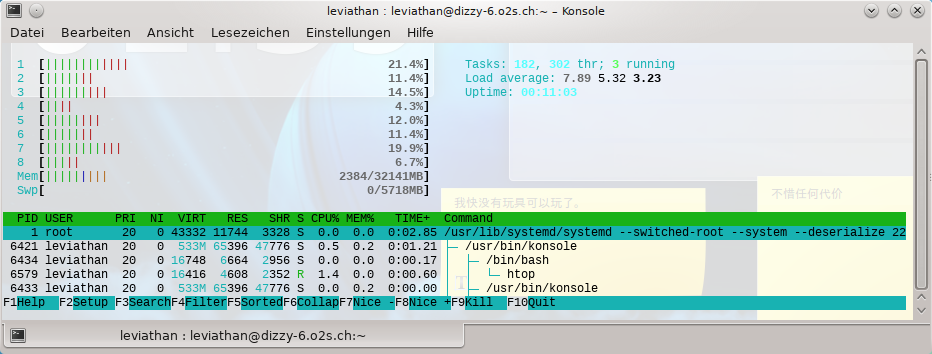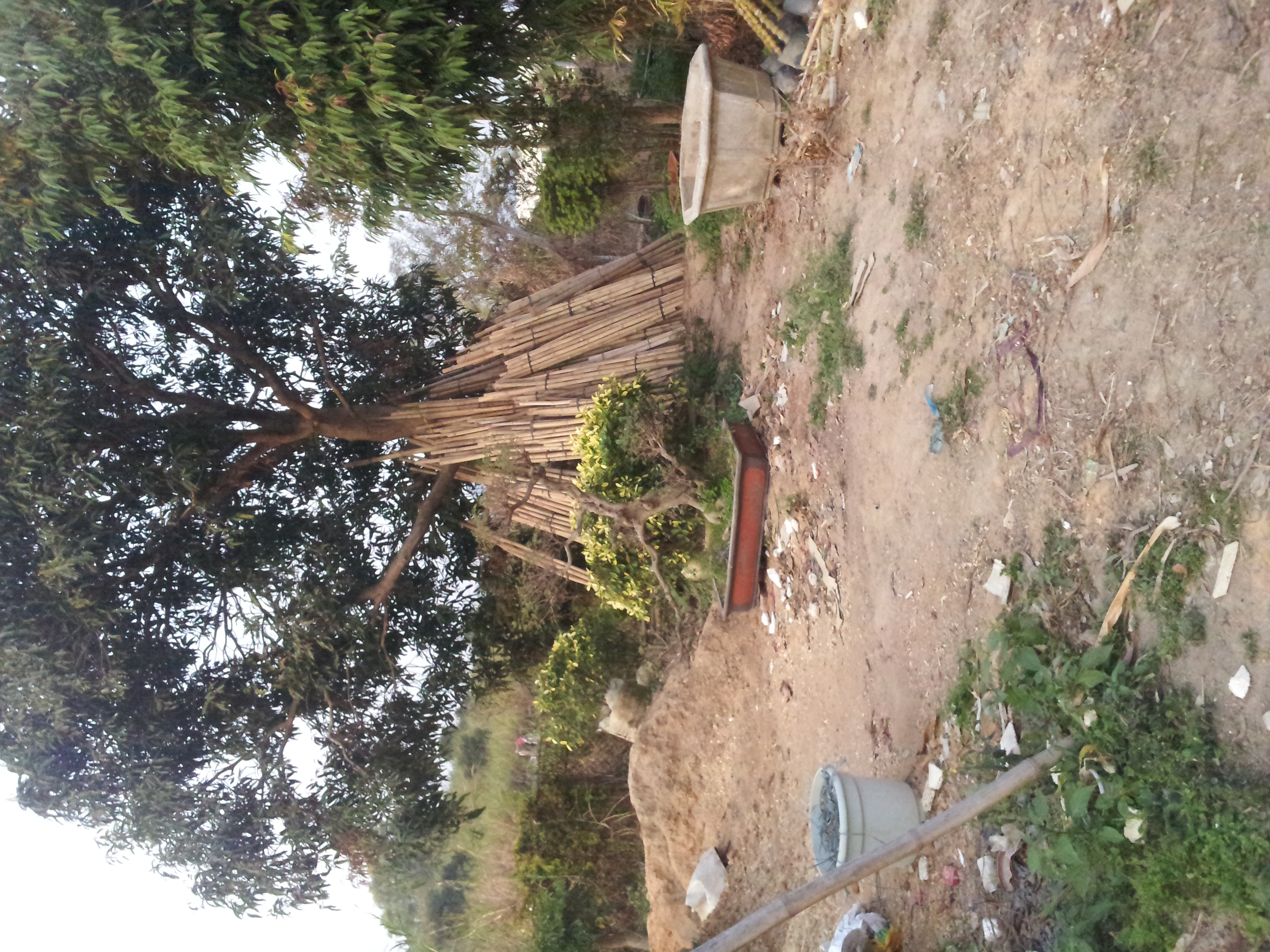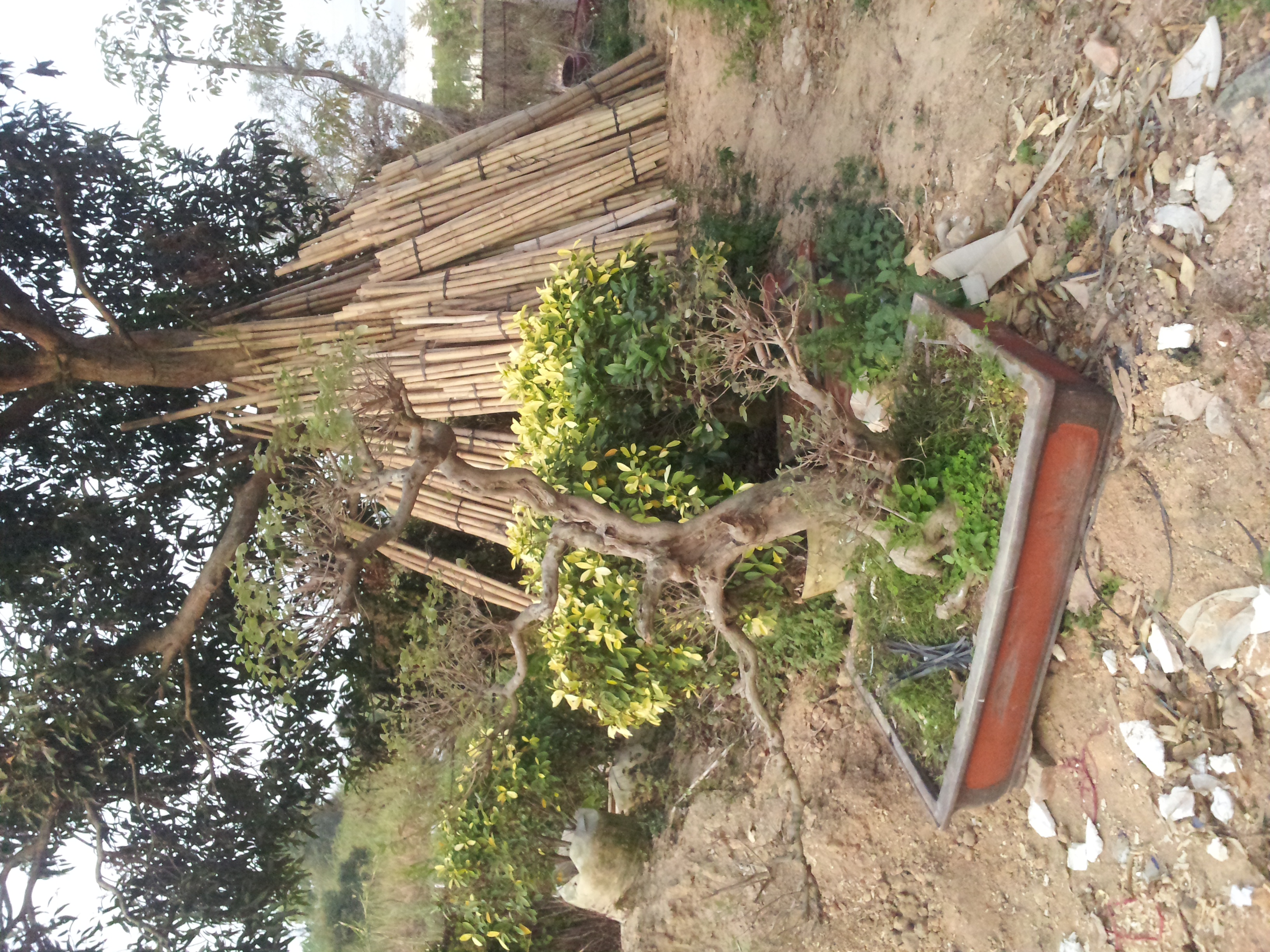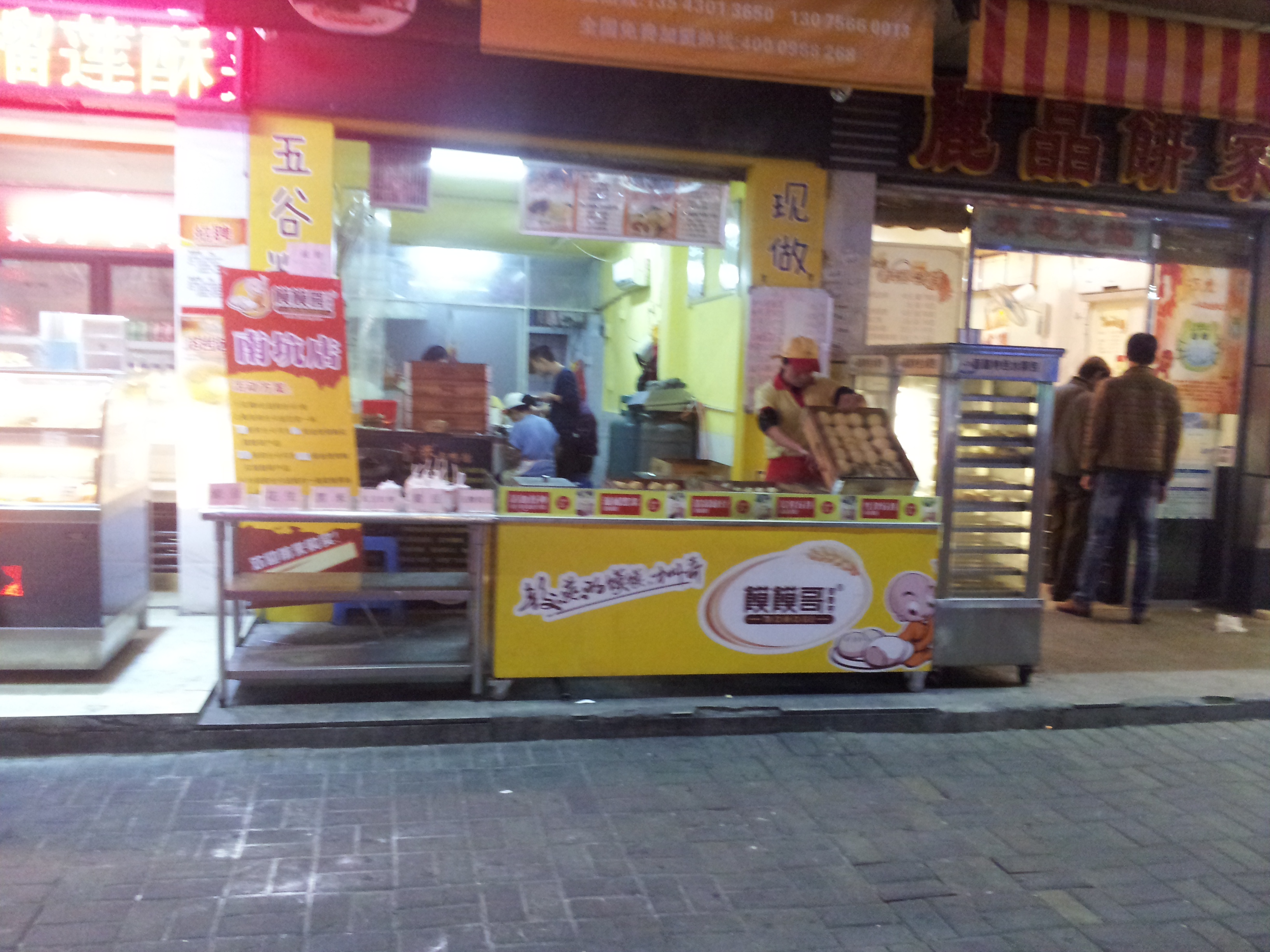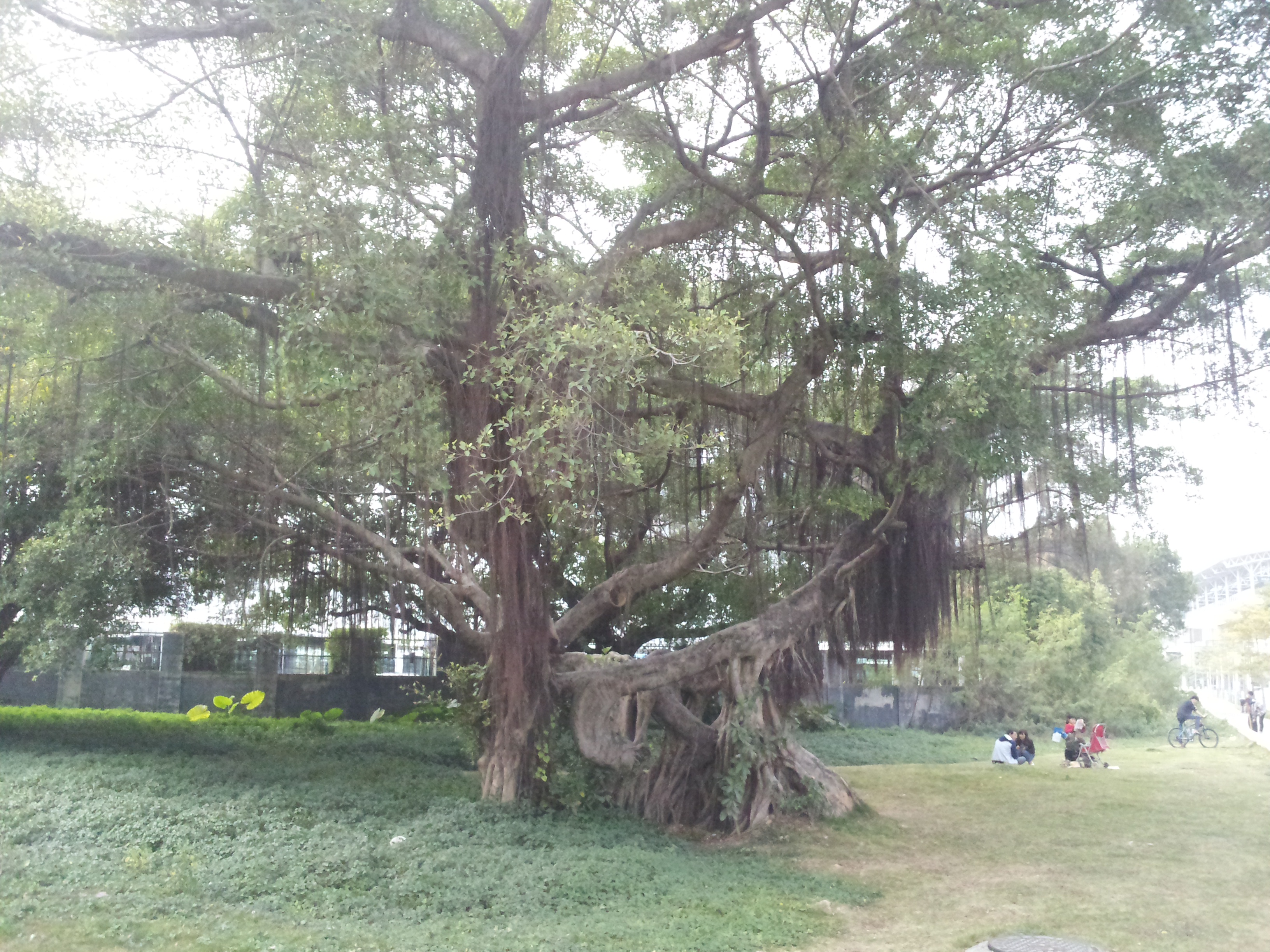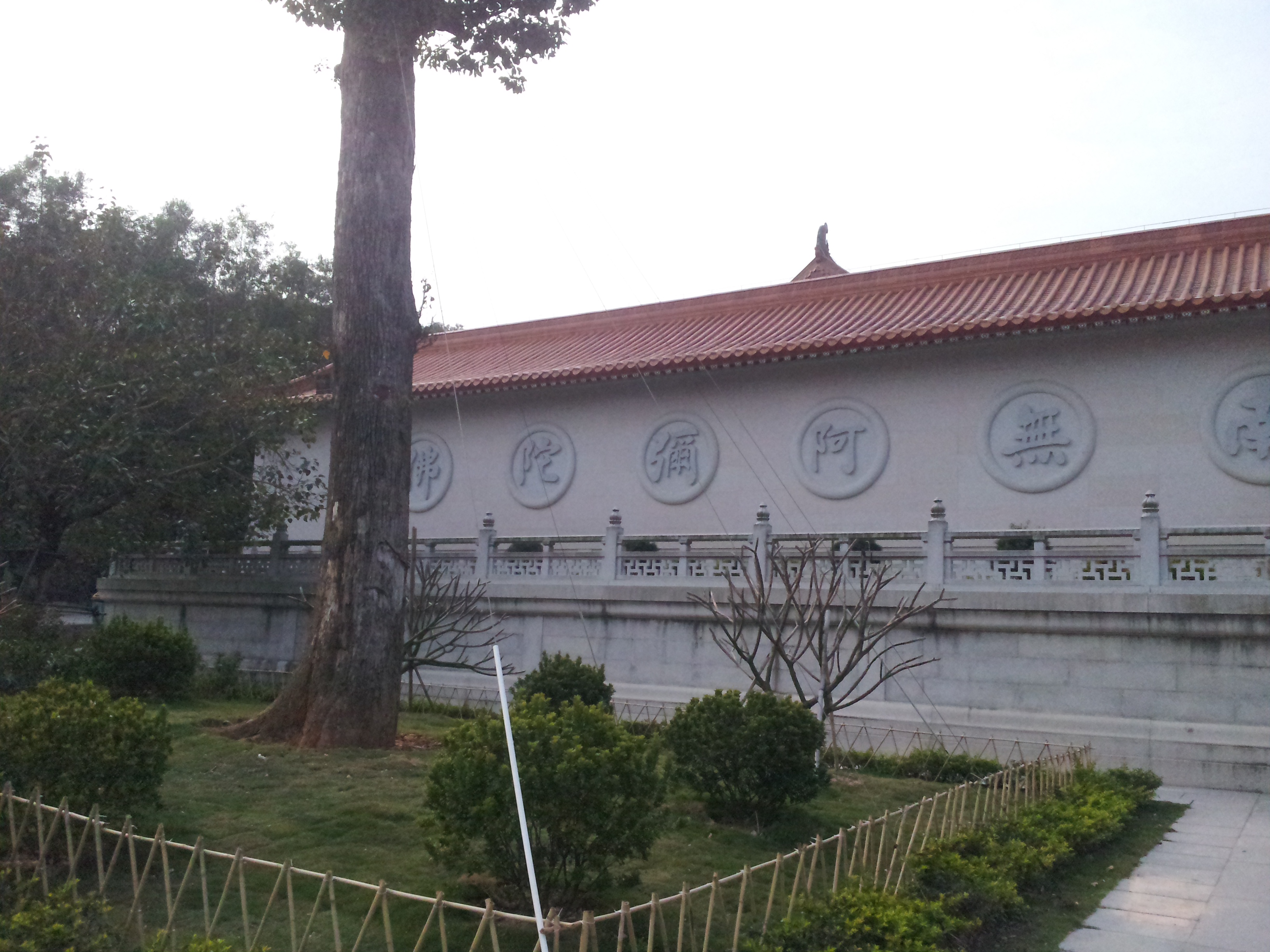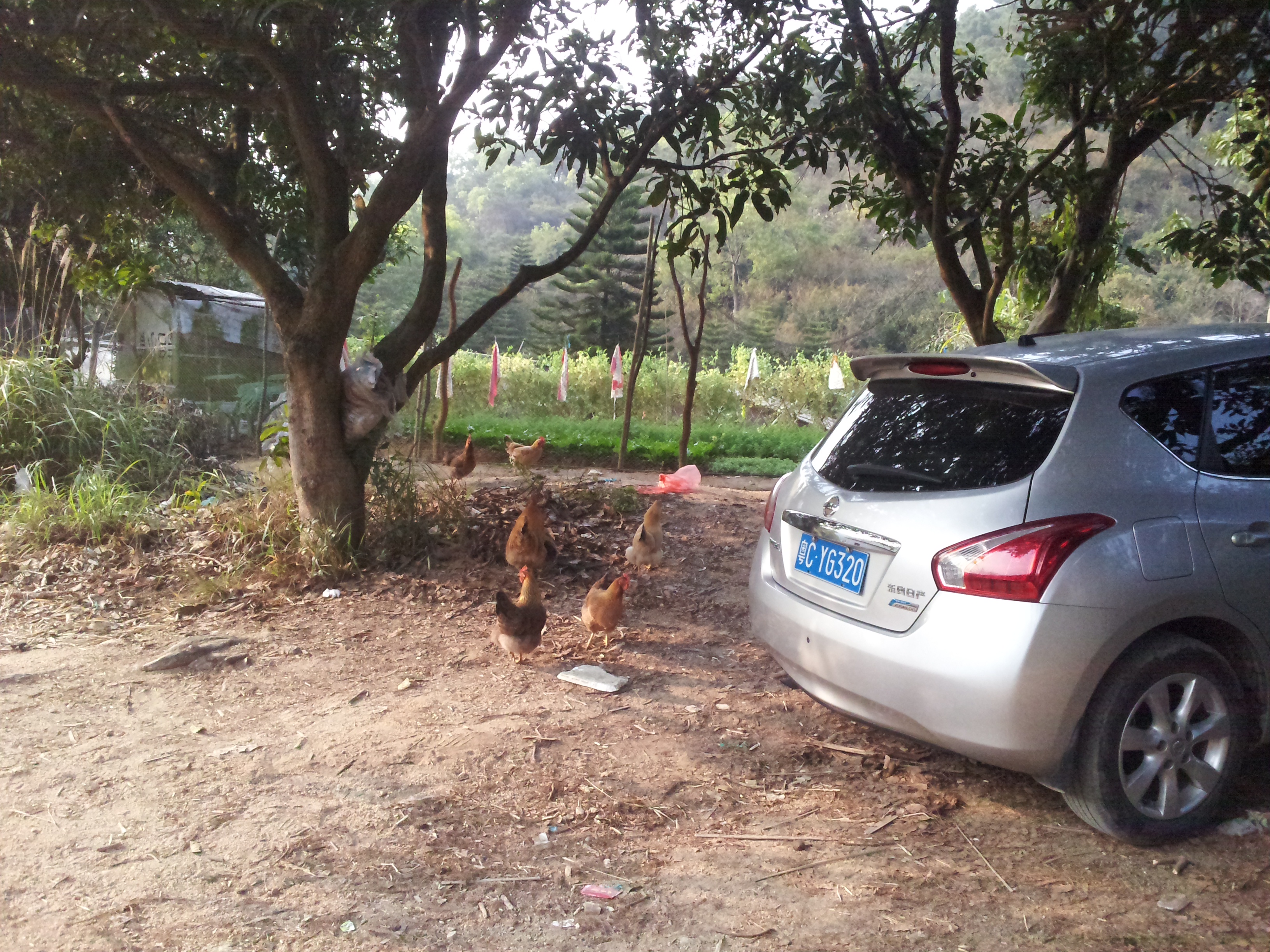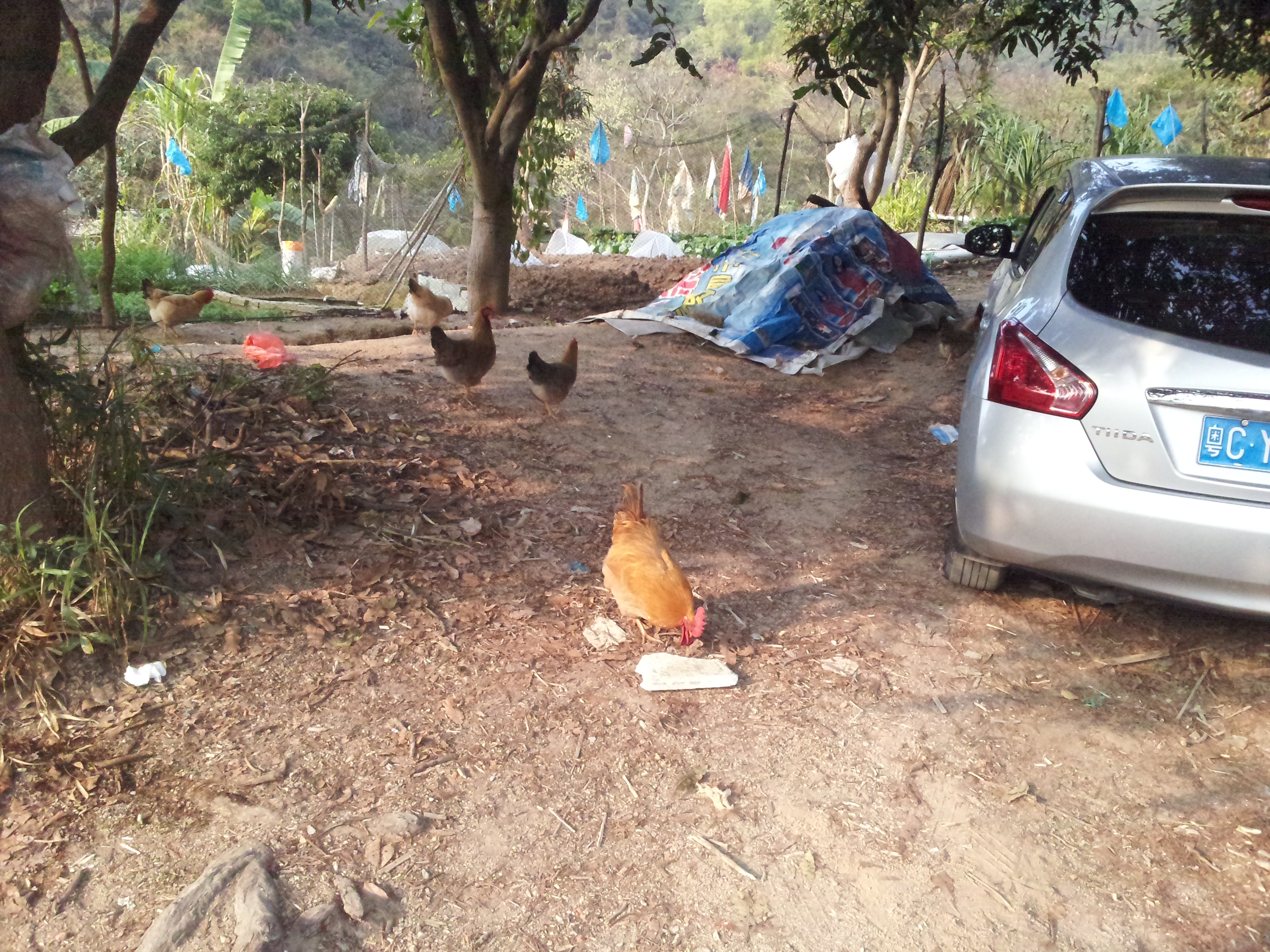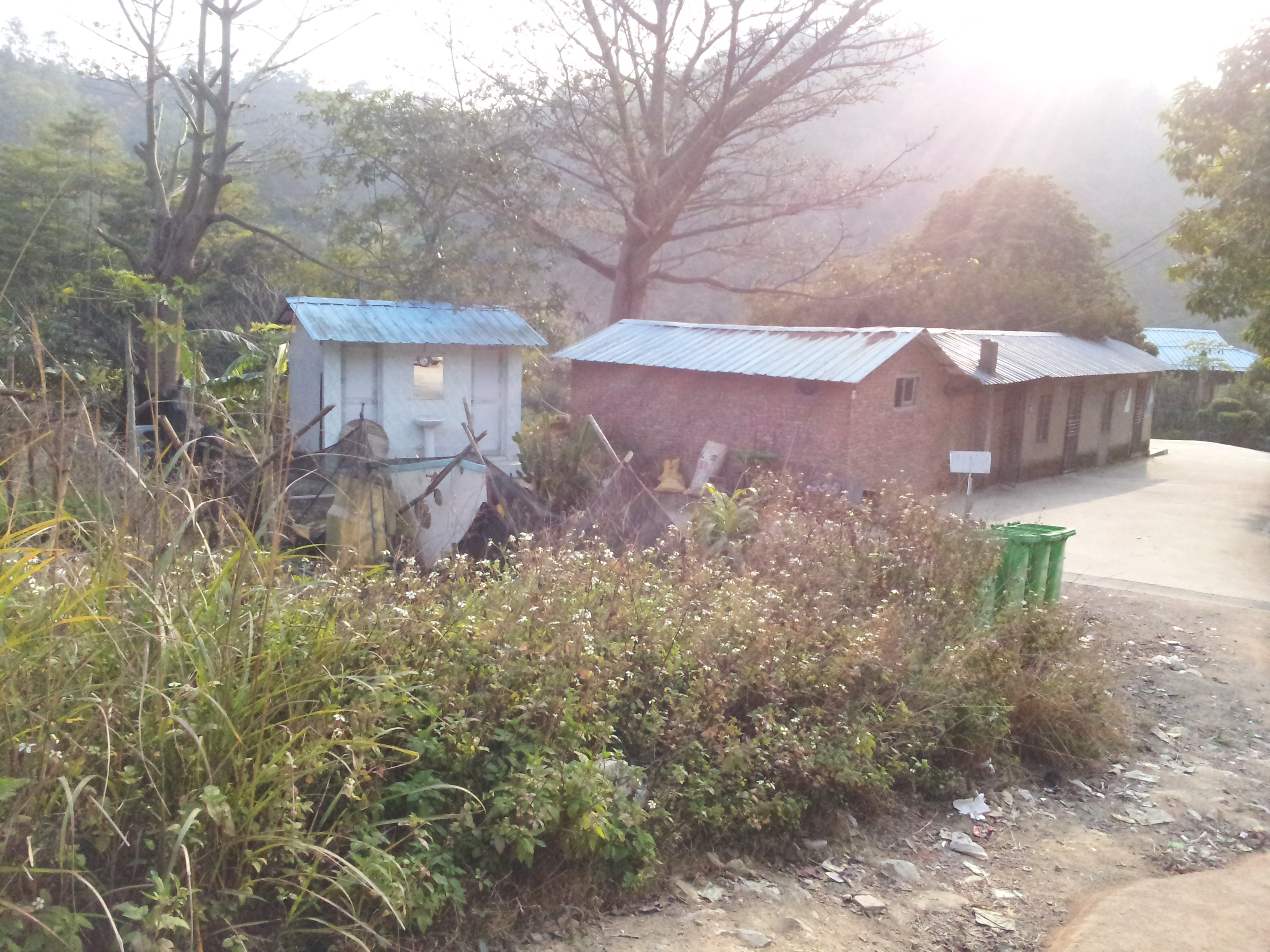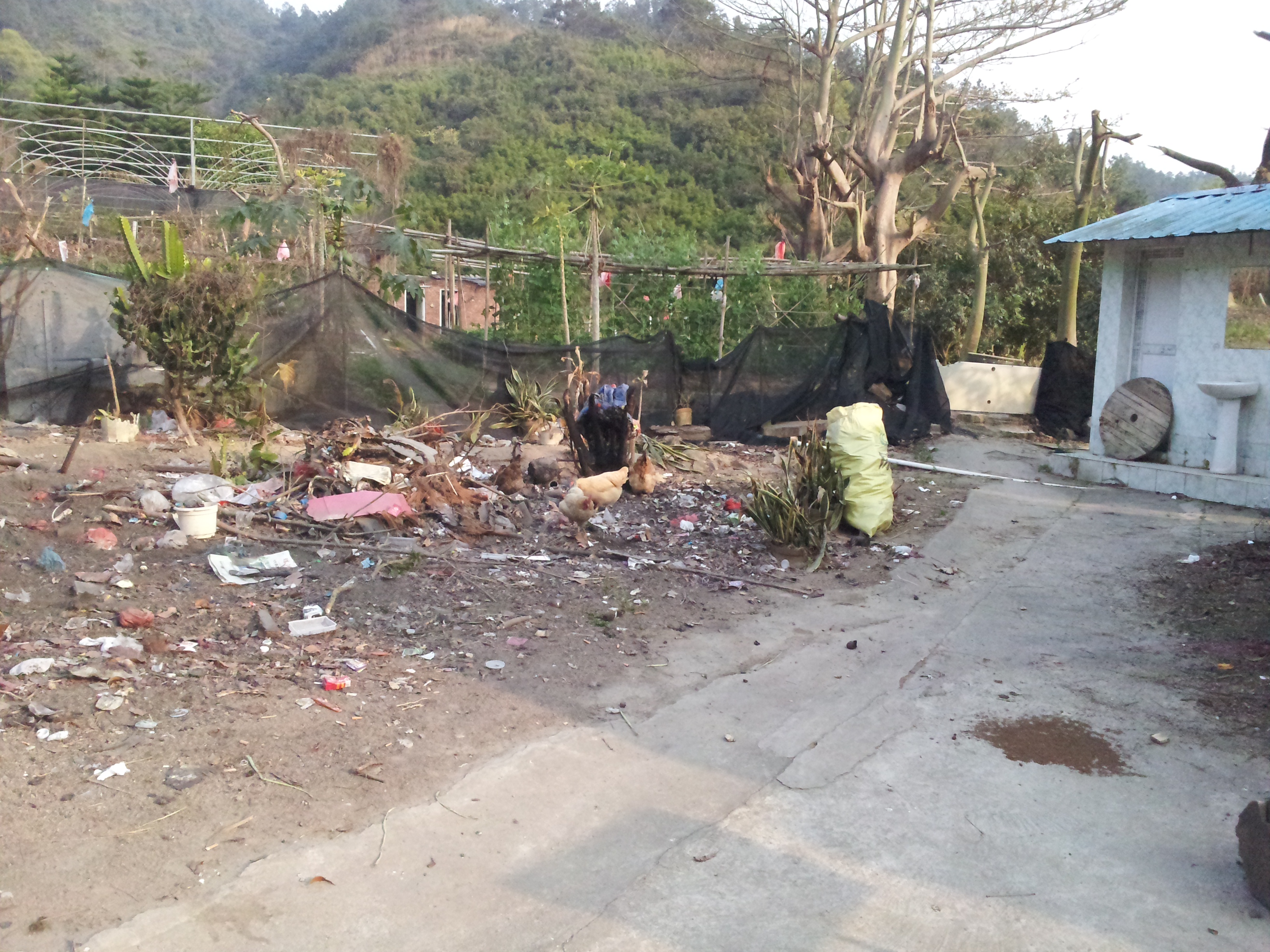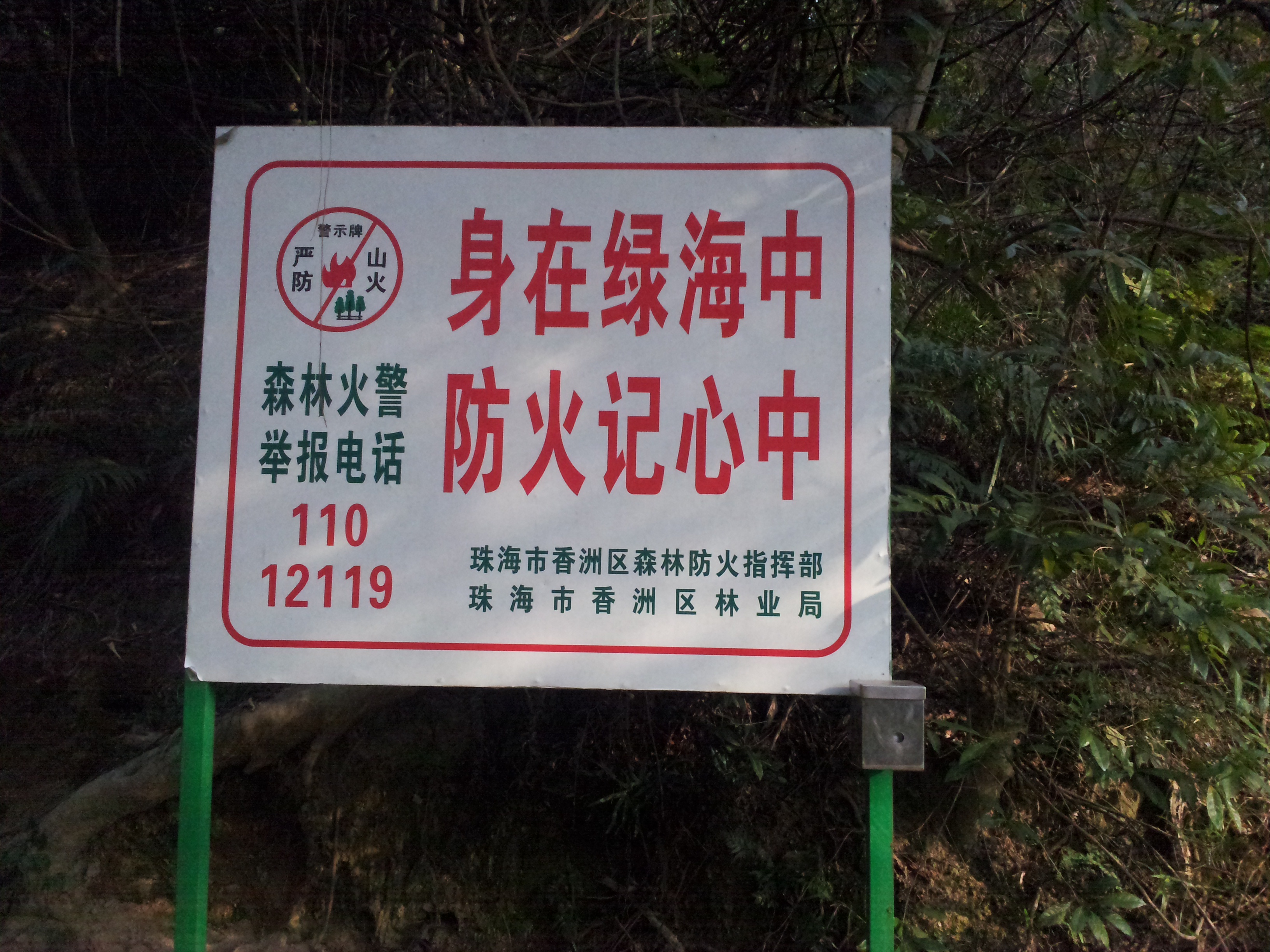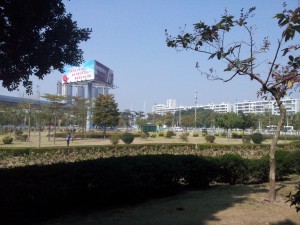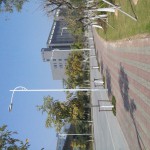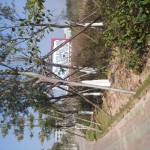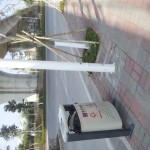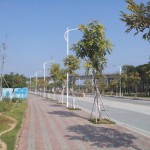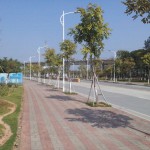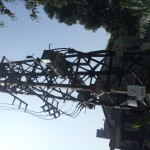Today I finally got graywolf and qflow running.
It’s available for download as a package from my OBS build repository:
https://build.opensuse.org/project/show/home:leviathanch:asic
The first glimpse of the transistormask of the RISC-V we’re going to tape our is here:
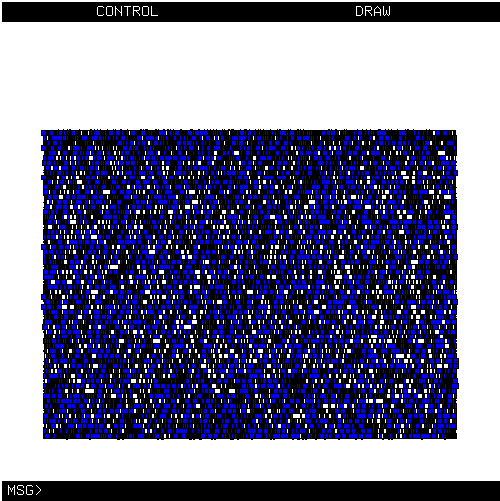
I’m using cliffords picorv32 which can be cloned from github:
https://github.com/cliffordwolf/picorv32
Category Archives: Daily life
Everything non scientific ;-)
Dragoncore/Loongson/龙芯 (step one)
Hi folks
I’m now living in China.
Here are some pictures of my first run of the 龙芯芯片.
Although the lab is still a total mess/battle zone is started working on the FOSS tablet project already.
As you can see the board I got from 龙芯 does power up and loads the PROM.
Next step is to compile a vmlinux for 2H in order to test the system.
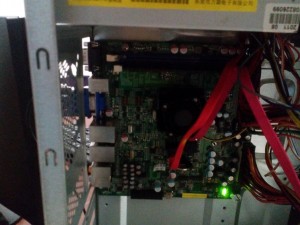
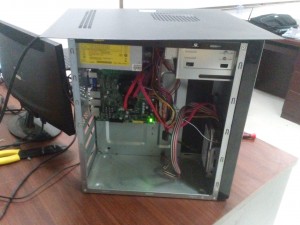
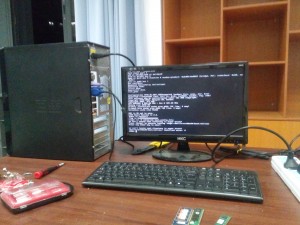
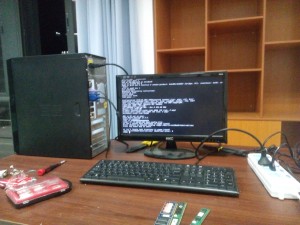
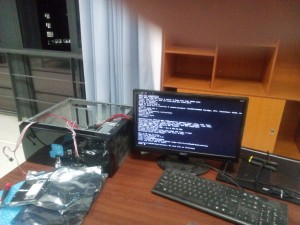
“Money printer”
Hi
I’m working on a python script which uses a cascaded triangular arbitrash in order to multiply money.
But so far the calculations seem to be all unsatisfying.
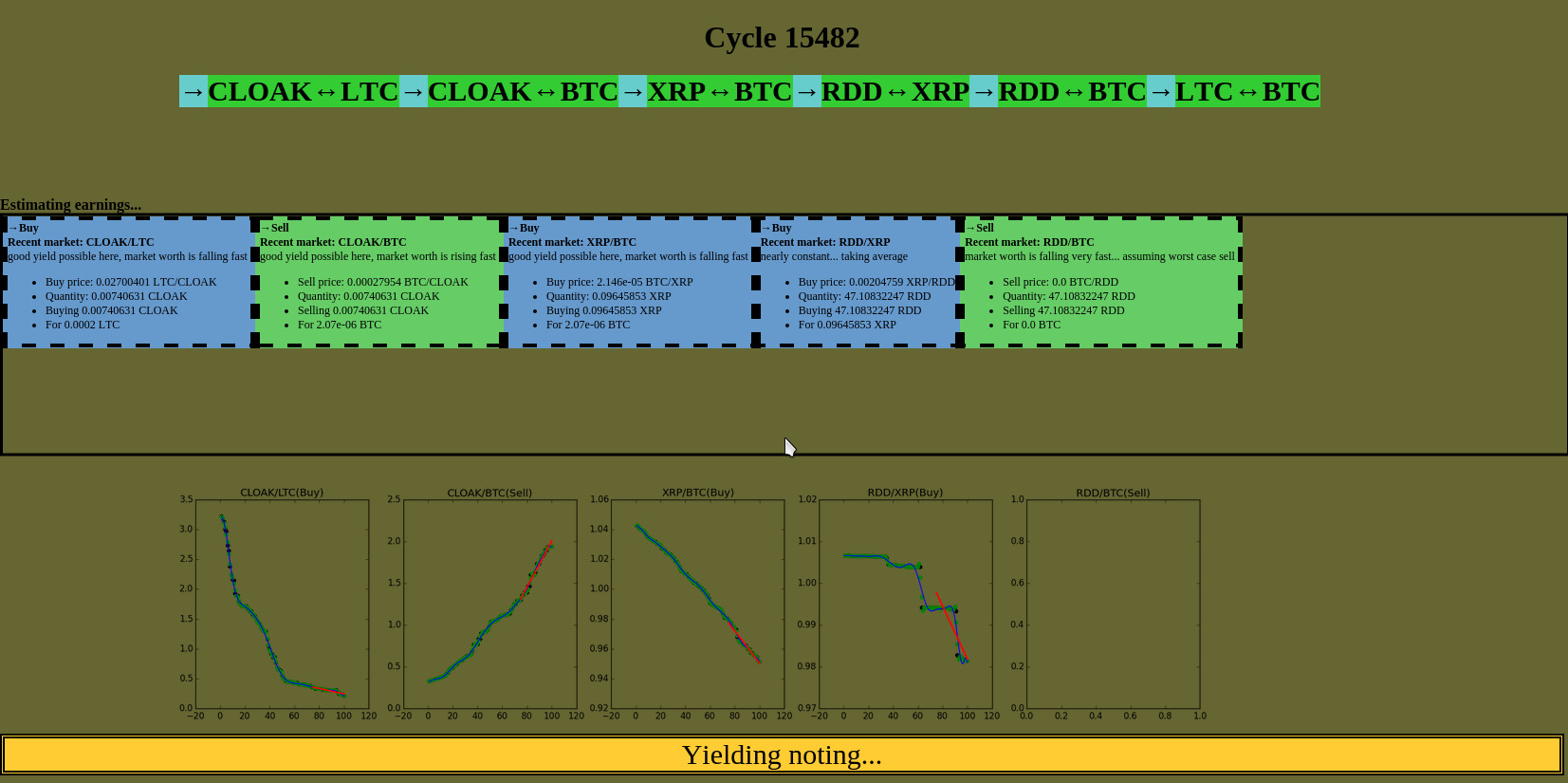
What I’m doing so far is fetching and filtering and interpolating the values in order to estimate the trade development:
#!/usr/bin/python
import sys
import os
import copy
import math
# delays:
from time import sleep
# web api
from Cryptsy import Api
#plotting the stuff
import matplotlib
matplotlib.use("TkAgg")
from matplotlib.pyplot import plot
from matplotlib.pyplot import figure
from matplotlib.pyplot import close
from matplotlib.backends.backend_tkagg import FigureCanvasTkAgg, NavigationToolbar2TkAgg
from IPython import display
#numpy stuff:
from numpy import delete
from numpy import array
from numpy import linspace
from numpy import polyfit
from numpy import poly1d
from numpy import newaxis
from numpy import ones
#scipy stuff
from scipy.signal import wiener
from scipy.optimize import curve_fit
from scipy.ndimage.filters import convolve1d
from scipy.interpolate import interp1d
from scipy.interpolate import InterpolatedUnivariateSpline
from scipy.signal import wiener
from scipy.signal import gaussian
from scipy.signal import savgol_filter
#sklearn
from sklearn.gaussian_process import GaussianProcess
from sklearn.linear_model import LinearRegression
from sklearn.isotonic import IsotonicRegression
from sklearn.cross_validation import cross_val_predict
from sklearn.preprocessing import PolynomialFeatures
from sklearn.pipeline import Pipeline
from sklearn.utils import check_random_state
#pyqt fit
from pyqt_fit import npr_methods
import pyqt_fit.nonparam_regression as smooth
…
x = linspace(1, len(price_array), len(price_array)) y = array(price_array) filtered_y = savgol_filter(y, window_length, savgol_filter_polyorder) k0 = smooth.NonParamRegression(x, filtered_y, method=npr_methods.LocalPolynomialKernel(q=gauss_poly_deg)) k0.fit() z = k0(x) avg_diff_number=len(x)/4 new_x=x[len(x)-avg_diff_number-1:] new_z=z[len(z)-avg_diff_number-1:] clf = LinearRegression() clf.fit(new_x[:,newaxis],new_z) tangent=clf.predict(new_x[:,newaxis]) num_different=(tangent[-1]-tangent[0])/(new_x[-1]-new_x[0])
If someone has a better idea: Please say so!
Two grakas, three displays… and X.org >.<'
Hi folks
This one looks easy… X.org should just detect it, right?
dizzy-6:/home/leviathan # lspci | grep VGA 01:00.0 VGA compatible controller: NVIDIA Corporation GT200b [GeForce GTX 275] (rev a1) 02:00.0 VGA compatible controller: Advanced Micro Devices, Inc. [AMD/ATI] Caicos [Radeon HD 6450/7450/8450]
Well… It didn’t. It had to tinker a whole day until I got the right xorg.conf
I figured I share it with you:
dizzy-6:/home/leviathan # cat /etc/X11/xorg.conf
Section "Device"
Identifier "radeon"
Driver "radeon"
BusID "PCI:2:0:0"
# Option "ZaphodHeads" "HDMI-0"
Screen 1
EndSection
Section "Device"
Identifier "nvidia-1"
Driver "nouveau"
BusID "PCI:1:0:0"
Option "ZaphodHeads" "DVI-I-1"
Screen 0
EndSection
Section "Device"
Identifier "nvidia-2"
Driver "nouveau"
BusID "PCI:1:0:0"
Option "ZaphodHeads" "DVI-I-2"
Screen 0
EndSection
Section "Monitor"
Identifier "DVI-I-1"
Option "RightOf" "DVI-I-2"
EndSection
Section "Monitor"
Identifier "DVI-I-2"
EndSection
Section "Monitor"
Identifier "HDMI-0"
EndSection
Section "Screen"
Identifier "left_screen"
Device "nvidia-1"
Monitor "DVI-I-1"
DefaultDepth 24
# SubSection "Display"
# Virtual 1600 1200
# EndSubSection
EndSection
Section "Screen"
Identifier "middle_screen"
Device "nvidia-2"
Monitor "DVI-I-2"
DefaultDepth 24
EndSection
Section "Screen"
Identifier "hdmi_screen"
Device "radeon"
Monitor "HDMI-0"
DefaultDepth 24
EndSection
Section "ServerLayout"
Identifier "My Layout"
# Option "Xinerama"
Screen "middle_screen" 0 0
Screen "left_screen" leftof "middle_screen"
Screen "hdmi_screen" rightof "middle_screen"
EndSection
My new PC
leviathan@dizzy-6:~/Pictures> cat /proc/cpuinfo processor : 0 vendor_id : AuthenticAMD cpu family : 21 model : 2 model name : AMD FX(tm)-8350 Eight-Core Processor stepping : 0 microcode : 0x6000822 cpu MHz : 1400.000 cache size : 2048 KB physical id : 0 siblings : 8 core id : 0 cpu cores : 4 apicid : 16 initial apicid : 0 fpu : yes fpu_exception : yes cpuid level : 13 wp : yes flags : fpu vme de pse tsc msr pae mce cx8 apic sep mtrr pge mca cmov pat pse36 clflush mmx fxsr sse sse2 ht syscall nx mmxext fxsr_opt pdpe1gb rdtscp lm constant_tsc rep_good nopl nonstop_tsc extd_apicid aperfmperf pni pclmulqdq monitor ssse3 fma cx16 sse4_1 sse4_2 popcnt aes xsave avx f16c lahf_lm cmp_legacy svm extapic cr8_legacy abm sse4a misalignsse 3dnowprefetch osvw ibs xop skinit wdt lwp fma4 tce nodeid_msr tbm topoext perfctr_core perfctr_nb arat cpb hw_pstate npt lbrv svm_lock nrip_save tsc_scale vmcb_clean flushbyasid decodeassists pausefilter pfthreshold bmi1 bogomips : 8027.43 TLB size : 1536 4K pages clflush size : 64 cache_alignment : 64 address sizes : 48 bits physical, 48 bits virtual power management: ts ttp tm 100mhzsteps hwpstate cpb eff_freq_ro processor : 1 vendor_id : AuthenticAMD cpu family : 21 model : 2 model name : AMD FX(tm)-8350 Eight-Core Processor stepping : 0 microcode : 0x6000822 cpu MHz : 1400.000 cache size : 2048 KB physical id : 0 siblings : 8 core id : 1 cpu cores : 4 apicid : 17 initial apicid : 1 fpu : yes fpu_exception : yes cpuid level : 13 wp : yes flags : fpu vme de pse tsc msr pae mce cx8 apic sep mtrr pge mca cmov pat pse36 clflush mmx fxsr sse sse2 ht syscall nx mmxext fxsr_opt pdpe1gb rdtscp lm constant_tsc rep_good nopl nonstop_tsc extd_apicid aperfmperf pni pclmulqdq monitor ssse3 fma cx16 sse4_1 sse4_2 popcnt aes xsave avx f16c lahf_lm cmp_legacy svm extapic cr8_legacy abm sse4a misalignsse 3dnowprefetch osvw ibs xop skinit wdt lwp fma4 tce nodeid_msr tbm topoext perfctr_core perfctr_nb arat cpb hw_pstate npt lbrv svm_lock nrip_save tsc_scale vmcb_clean flushbyasid decodeassists pausefilter pfthreshold bmi1 bogomips : 8027.43 TLB size : 1536 4K pages clflush size : 64 cache_alignment : 64 address sizes : 48 bits physical, 48 bits virtual power management: ts ttp tm 100mhzsteps hwpstate cpb eff_freq_ro processor : 2 vendor_id : AuthenticAMD cpu family : 21 model : 2 model name : AMD FX(tm)-8350 Eight-Core Processor stepping : 0 microcode : 0x6000822 cpu MHz : 1400.000 cache size : 2048 KB physical id : 0 siblings : 8 core id : 2 cpu cores : 4 apicid : 18 initial apicid : 2 fpu : yes fpu_exception : yes cpuid level : 13 wp : yes flags : fpu vme de pse tsc msr pae mce cx8 apic sep mtrr pge mca cmov pat pse36 clflush mmx fxsr sse sse2 ht syscall nx mmxext fxsr_opt pdpe1gb rdtscp lm constant_tsc rep_good nopl nonstop_tsc extd_apicid aperfmperf pni pclmulqdq monitor ssse3 fma cx16 sse4_1 sse4_2 popcnt aes xsave avx f16c lahf_lm cmp_legacy svm extapic cr8_legacy abm sse4a misalignsse 3dnowprefetch osvw ibs xop skinit wdt lwp fma4 tce nodeid_msr tbm topoext perfctr_core perfctr_nb arat cpb hw_pstate npt lbrv svm_lock nrip_save tsc_scale vmcb_clean flushbyasid decodeassists pausefilter pfthreshold bmi1 bogomips : 8027.43 TLB size : 1536 4K pages clflush size : 64 cache_alignment : 64 address sizes : 48 bits physical, 48 bits virtual power management: ts ttp tm 100mhzsteps hwpstate cpb eff_freq_ro processor : 3 vendor_id : AuthenticAMD cpu family : 21 model : 2 model name : AMD FX(tm)-8350 Eight-Core Processor stepping : 0 microcode : 0x6000822 cpu MHz : 1400.000 cache size : 2048 KB physical id : 0 siblings : 8 core id : 3 cpu cores : 4 apicid : 19 initial apicid : 3 fpu : yes fpu_exception : yes cpuid level : 13 wp : yes flags : fpu vme de pse tsc msr pae mce cx8 apic sep mtrr pge mca cmov pat pse36 clflush mmx fxsr sse sse2 ht syscall nx mmxext fxsr_opt pdpe1gb rdtscp lm constant_tsc rep_good nopl nonstop_tsc extd_apicid aperfmperf pni pclmulqdq monitor ssse3 fma cx16 sse4_1 sse4_2 popcnt aes xsave avx f16c lahf_lm cmp_legacy svm extapic cr8_legacy abm sse4a misalignsse 3dnowprefetch osvw ibs xop skinit wdt lwp fma4 tce nodeid_msr tbm topoext perfctr_core perfctr_nb arat cpb hw_pstate npt lbrv svm_lock nrip_save tsc_scale vmcb_clean flushbyasid decodeassists pausefilter pfthreshold bmi1 bogomips : 8027.43 TLB size : 1536 4K pages clflush size : 64 cache_alignment : 64 address sizes : 48 bits physical, 48 bits virtual power management: ts ttp tm 100mhzsteps hwpstate cpb eff_freq_ro processor : 4 vendor_id : AuthenticAMD cpu family : 21 model : 2 model name : AMD FX(tm)-8350 Eight-Core Processor stepping : 0 microcode : 0x6000822 cpu MHz : 1400.000 cache size : 2048 KB physical id : 0 siblings : 8 core id : 4 cpu cores : 4 apicid : 20 initial apicid : 4 fpu : yes fpu_exception : yes cpuid level : 13 wp : yes flags : fpu vme de pse tsc msr pae mce cx8 apic sep mtrr pge mca cmov pat pse36 clflush mmx fxsr sse sse2 ht syscall nx mmxext fxsr_opt pdpe1gb rdtscp lm constant_tsc rep_good nopl nonstop_tsc extd_apicid aperfmperf pni pclmulqdq monitor ssse3 fma cx16 sse4_1 sse4_2 popcnt aes xsave avx f16c lahf_lm cmp_legacy svm extapic cr8_legacy abm sse4a misalignsse 3dnowprefetch osvw ibs xop skinit wdt lwp fma4 tce nodeid_msr tbm topoext perfctr_core perfctr_nb arat cpb hw_pstate npt lbrv svm_lock nrip_save tsc_scale vmcb_clean flushbyasid decodeassists pausefilter pfthreshold bmi1 bogomips : 8027.43 TLB size : 1536 4K pages clflush size : 64 cache_alignment : 64 address sizes : 48 bits physical, 48 bits virtual power management: ts ttp tm 100mhzsteps hwpstate cpb eff_freq_ro processor : 5 vendor_id : AuthenticAMD cpu family : 21 model : 2 model name : AMD FX(tm)-8350 Eight-Core Processor stepping : 0 microcode : 0x6000822 cpu MHz : 1400.000 cache size : 2048 KB physical id : 0 siblings : 8 core id : 5 cpu cores : 4 apicid : 21 initial apicid : 5 fpu : yes fpu_exception : yes cpuid level : 13 wp : yes flags : fpu vme de pse tsc msr pae mce cx8 apic sep mtrr pge mca cmov pat pse36 clflush mmx fxsr sse sse2 ht syscall nx mmxext fxsr_opt pdpe1gb rdtscp lm constant_tsc rep_good nopl nonstop_tsc extd_apicid aperfmperf pni pclmulqdq monitor ssse3 fma cx16 sse4_1 sse4_2 popcnt aes xsave avx f16c lahf_lm cmp_legacy svm extapic cr8_legacy abm sse4a misalignsse 3dnowprefetch osvw ibs xop skinit wdt lwp fma4 tce nodeid_msr tbm topoext perfctr_core perfctr_nb arat cpb hw_pstate npt lbrv svm_lock nrip_save tsc_scale vmcb_clean flushbyasid decodeassists pausefilter pfthreshold bmi1 bogomips : 8027.43 TLB size : 1536 4K pages clflush size : 64 cache_alignment : 64 address sizes : 48 bits physical, 48 bits virtual power management: ts ttp tm 100mhzsteps hwpstate cpb eff_freq_ro processor : 6 vendor_id : AuthenticAMD cpu family : 21 model : 2 model name : AMD FX(tm)-8350 Eight-Core Processor stepping : 0 microcode : 0x6000822 cpu MHz : 1400.000 cache size : 2048 KB physical id : 0 siblings : 8 core id : 6 cpu cores : 4 apicid : 22 initial apicid : 6 fpu : yes fpu_exception : yes cpuid level : 13 wp : yes flags : fpu vme de pse tsc msr pae mce cx8 apic sep mtrr pge mca cmov pat pse36 clflush mmx fxsr sse sse2 ht syscall nx mmxext fxsr_opt pdpe1gb rdtscp lm constant_tsc rep_good nopl nonstop_tsc extd_apicid aperfmperf pni pclmulqdq monitor ssse3 fma cx16 sse4_1 sse4_2 popcnt aes xsave avx f16c lahf_lm cmp_legacy svm extapic cr8_legacy abm sse4a misalignsse 3dnowprefetch osvw ibs xop skinit wdt lwp fma4 tce nodeid_msr tbm topoext perfctr_core perfctr_nb arat cpb hw_pstate npt lbrv svm_lock nrip_save tsc_scale vmcb_clean flushbyasid decodeassists pausefilter pfthreshold bmi1 bogomips : 8027.43 TLB size : 1536 4K pages clflush size : 64 cache_alignment : 64 address sizes : 48 bits physical, 48 bits virtual power management: ts ttp tm 100mhzsteps hwpstate cpb eff_freq_ro processor : 7 vendor_id : AuthenticAMD cpu family : 21 model : 2 model name : AMD FX(tm)-8350 Eight-Core Processor stepping : 0 microcode : 0x6000822 cpu MHz : 1400.000 cache size : 2048 KB physical id : 0 siblings : 8 core id : 7 cpu cores : 4 apicid : 23 initial apicid : 7 fpu : yes fpu_exception : yes cpuid level : 13 wp : yes flags : fpu vme de pse tsc msr pae mce cx8 apic sep mtrr pge mca cmov pat pse36 clflush mmx fxsr sse sse2 ht syscall nx mmxext fxsr_opt pdpe1gb rdtscp lm constant_tsc rep_good nopl nonstop_tsc extd_apicid aperfmperf pni pclmulqdq monitor ssse3 fma cx16 sse4_1 sse4_2 popcnt aes xsave avx f16c lahf_lm cmp_legacy svm extapic cr8_legacy abm sse4a misalignsse 3dnowprefetch osvw ibs xop skinit wdt lwp fma4 tce nodeid_msr tbm topoext perfctr_core perfctr_nb arat cpb hw_pstate npt lbrv svm_lock nrip_save tsc_scale vmcb_clean flushbyasid decodeassists pausefilter pfthreshold bmi1 bogomips : 8027.43 TLB size : 1536 4K pages clflush size : 64 cache_alignment : 64 address sizes : 48 bits physical, 48 bits virtual power management: ts ttp tm 100mhzsteps hwpstate cpb eff_freq_ro
u-boot mainline from denx
Git clone:
git clone git://git.denx.de/u-boot.git
Configure:
cd u-boot CROSS_COMPILE=arm-linux-gnueabi- make clean CROSS_COMPILE=arm-linux-gnueabi- make Cubieboard2_defconfig
Compile:
CROSS_COMPILE=arm-linux-gnueabi- make -j6
Installation:
dd if=u-boot-sunxi-with-spl.bin of=/dev/sdX bs=1024 seek=8
Where /dev/sdX is the device file for your SD card. (Hint: use dmesg to find it out)
Using gamma ray as energy source?
A friend asked me a question on how feasible it would be to use gamma rays as an energy source. So let’s crunch some numbers: The wavelength of gamma rays is
\[\lambda=\frac{c}{f}=0.005 nm\]
Since the optimum length l for an antenna is
\[l=\frac{\lambda}{4}=0.00125 nm=1.25 pm\]
We are a bit in trouble here since the radius of the atom Sodium for instance is approximately 160 pm.
Physically it’s just not possible to build such a small antenna.
My trip to China (Chapter 4)
Today… Let’s just say: I’ve found the StarBucks.
It’s exactly as the StarBucks in Switzerland. I mean exactly the same.
Only that an Americano middle sized cup (for take away) is only 3.50 CHFr and not 5.00 CHFr.! ^_^
Agricultural paradise
Well… I didn’t find it in time… Also as far as I could see… It’s not really as interesting as some travelling blogs have described it.
Lovers road
Well. I didn’t go straight there either because I was stuck at the bubble tea and steamed bread corner where I’ve found fresh Manju (with red bean stuffing! *_*) as you can find a recipe for on my blog.
Also I’ve found Banh Bao… After this dinner I was so stuffed that I decided to roll back home.
Ahh! I talked Chinese a lot more today ^_^
My trip to China (Chapter 3)
My trip to China (Chapter 2)
Park in Zhuhai (珠海)
Actually just one of so many parks in 珠海. I passed by this place on my way to the 客车68号 (Bus number 68) to the office of Allwinner Technology.
My way to Allwinner Technology
Since the security guard at the entrance already looked a bit confused when I sat down and tried to make clear to him with my dictionary that I was two hours too early for the meeting I’ve let it be to make pictures of the entrance.
Just be told, that the company has a beautiful modern new building now with leather seats and mings vases and two big red Chinese lanterns at the entrance.
A beautiful office building! *_*
Dinner (sponsored by Allwinner)
Best food of my life (2.0)! ^^
我不想回来瑞士! (I don’t wanna go back to Switzerland) *_*
Ah and btw, maybe I don’t have to.
I seems as if the dinner has brought up some additional business ideas which would justify my employment at their company =D
